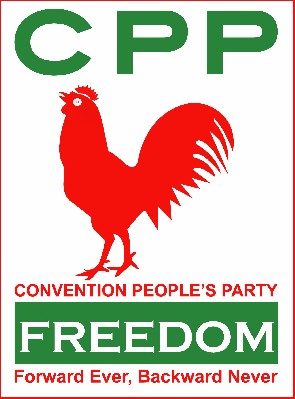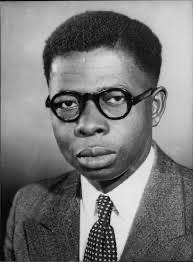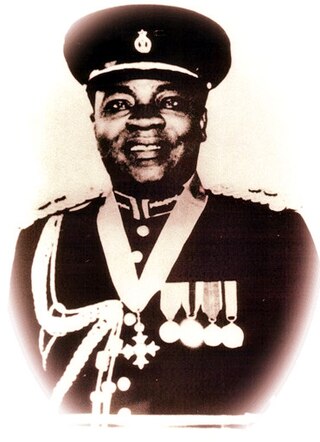Related Research Articles

Francis Kwame Nkrumah was a Ghanaian politician, political theorist, and revolutionary. He served as Prime Minister of the Gold Coast from 1952 until 1957, when it gained independence from Britain. He was then the first Prime Minister and then the President of Ghana, from 1957 until 1966. An influential advocate of Pan-Africanism, Nkrumah was a founding member of the Organization of African Unity and winner of the Lenin Peace Prize from the Soviet Union in 1962.

Komla Agbeli Gbedemah was a Ghanaian politician and Minister for Finance in Ghana's Nkrumah government between 1954 and 1961. Known popularly as "Afro Gbede", he was an indigene of Anyako in the Volta Region of Ghana.

The Convention People's Party (CPP) is a socialist political party in Ghana based on the ideas of the first President of Ghana, Kwame Nkrumah. The CPP was formed in June 1949 after Nkrumah broke away from the United Gold Coast Convention (UGCC).

Joseph Kwame Kyeretwie Boakye Danquah was a Ghanaian politician, scholar, anglophile, lawyer and statesman. He was a politician in pre- and post-colonial Ghana, which was formerly the Gold Coast.

Ako Adjei, was a Ghanaian statesman, politician, lawyer and journalist. He was a member of the United Gold Coast Convention and one of six leaders who were detained during Ghana's struggle for political independence from Britain, a group famously called The Big Six. Adjei became a member of parliament as a Convention People's Party candidate in 1954 and held ministerial offices until 1962 when as Minister for Foreign Affairs he was wrongfully detained for the Kulungugu bomb attack.

The National Liberation Council (NLC) led the Ghanaian government from 24 February 1966 to 1 October 1969. The body emerged from a coup d'état against the Nkrumah government carried out jointly by the Ghana Police Service and Ghana Armed Forces with collaboration from the Ghana Civil Service.

Erasmus Ransford Tawiah Madjitey, was a Ghanaian police officer, diplomat and politician. He was appointed Police Commissioner in the Dominion of Ghana on 9 October 1958, making him not only the first Ghanaian to head the Ghana Police Service, but also the first African south of the Sahara and in the British Commonwealth to command a police force.
The Anlo Youth Organisation was a political party that existed in the Gold Coast and later Ghana. It campaigned for the Ewe people under British rule to stay within Ghana after independence. It ended by merging with other parties to form a united opposition to the Convention People's Party.

Helena Ritz Fathia Nkrumah, born Fathia Halim Rizk, was an Egyptian, and the First Lady of the newly independent Ghana as the wife of Kwame Nkrumah, its first president.

General elections were held in Gold Coast on 8 February 1951. Although elections had been held for the Legislative Council since 1925, the Council did not have complete control over the legislation, and the voting franchise was limited to residents of urban areas meeting property requirements and the councils of chiefs. The 1951 elections were the first in Africa to be held under universal suffrage.

The mass media in Ghana, includes television, radio, internet publishing and newspapers.

Archibald "Archie" Casely-Hayford was a British-trained Ghanaian barrister and politician, who was involved in nationalist politics in the former Gold Coast. Having joined the Convention People's Party (CPP), in 1951 he was elected Municipal Member for Kumasi and was appointed by Kwame Nkrumah Minister of Agriculture and Natural Resources in the government of the First Republic. When Nkrumah declared Ghana's Independence on 6 March 1957, he was photographed on the podium flanked by Casely-Hayford, together with Kojo Botsio, Komla Agbeli Gbedemah, Nathaniel Azarco Welbeck and Krobo Edusei.

Ivor Kobina Greenstreet (born 31 May 1966) is a Ghanaian politician and lawyer. He was the Presidential candidate for the Convention People's Party (CPP) in the 2020 Ghanaian general election.
Nathaniel Azarco Welbeck (1915–1972) was a Ghanaian politician and a diplomat. He was a member of the Convention People's Party and minister of state in the first republic. He was briefly resident minister of Ghana in Guinea and also resident minister of Ghana in Congo.
Henry Plange Nyemitei was a Ghanaian insurance manager and football administrator. He was president and chairman of Accra Hearts of Oak Football Club. During his stewardship, Hearts of Oak competed in the first edition of the Ghana Premier League in 1956 and became the first football club in Ghana to be elevated from amateur status to professional status in 1980. Nyemitei was chairman of the Ghana Football Association from 1966 to 1967 and 1968 to 1971.
Paul Nii Teiko Tagoe was a Ghanaian politician. He served as a minister of state and a member of parliament during the first republic. He was a regional commissioner for the Greater Accra Region, first parliamentary secretary and also a member of parliament for the Ga Rural electoral district.
Gershon Ashie Nikoi was a Ghanaian politician, Pan-African activist, and a farmer. He was a founding member of the Convention People's Party (C.P.P.) and founder of the Ghana Farmers' Congress.
Hugh Horatio Cofie-Crabbe was a Ghanaian politician who is notable as being detained with two cabinet ministers for the Kulungugu bomb attempt on the life of Ghana's political leader Kwame Nkrumah in 1962. At the time of being detained, he was the executive secretary of Nkrumah's Convention People's Party and a widely known party functionary.
References
- 1 2 Houser, George M. (September 1957). "Africa Revisited". Africa Today. 4 (5): 3–7. ISSN 0001-9887 . Retrieved 25 September 2024.
- ↑ Asante Fordjour. "The Triggers Of A Dying Regime". justiceghana.com. Retrieved 25 September 2024.
- 1 2 3 4 5 Quarcoopome, S. S. (1992). "URBANISATION, LAND ALIENATION AND POLITICS IN ACCRA" (PDF). Research Review. 8 (1–2): 40–54. Retrieved 25 September 2024.
- ↑ Philip Afeti Korto (14 March 2021). "The Failed Nkrumah War Against The Monster Of Tribal Politics In Ghana-Episode 1". modernghana.com. Retrieved 25 September 2024.
- ↑ "The Preventive Detention Act of 1958, Was It A Shield or A Sword?". ghanaweb.com. Retrieved 25 September 2024.
- ↑ Michael Sumaila Nlasia (20 July 2019). "The problems of tribalism with African democracy". Graphic Online. Graphic Communications Group Ltd. Retrieved 25 September 2024.
- ↑ Adam Higazi (June 2004). "Policy Levers in Ghana" (PDF). Centre for Research on Inequality, Human Security and Ethnicity, CRISE, Queen Elizabeth House, University of Oxford. p. 5. Retrieved 25 September 2024.